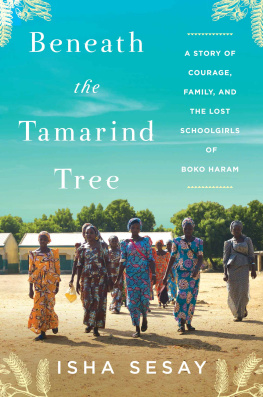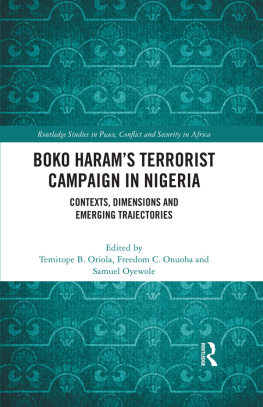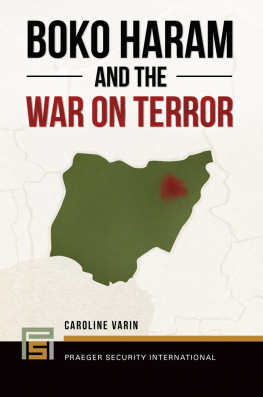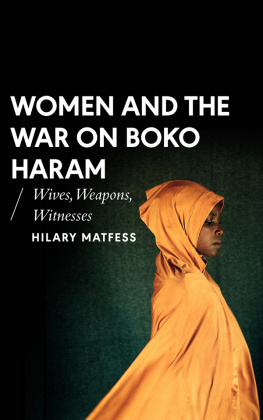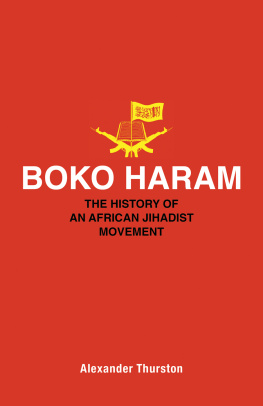T HE SINGING WAS SO SOFT AT FIRST, I THOUGHT MY MIND WAS PLAYING tricks. I stopped unpacking my frayed leather duffel and stood completely still. With my head half-cocked, my neck craning, I waited, expectant, in my bare hotel room. Then I heard it again. This time, the haunting medley of voices filling the air was unmistakable. But who was singing?
I was in Yola, northern Nigeria, in December 2016, counting down the hours till I set off on a pilgrimage of sortsto witness the long-awaited return home of the twenty-one Chibok girls. Just a few weeks earlier, much of the world had been stunned by their sudden release, after years in Boko Haram captivity. Now the girls were finally returning to families and to a community desperate to welcome them back to the very place from which theyd been stolen. Their homecoming was under way and I was covering the emotional journey for CNN.
A host of thoughts ran through my head as I tried to make sense of the music. I knew the CNN team was staying in the same hotel as the girls. I also knew the building was on lockdown, surrounded by a ring of armed Nigerian security forcesaccess was severely restricted, so it was unlikely that a choir had made its way onto the grounds.
The singing got louder, even more joyful. The harmonies pulled at me, insistent, drawing me out from the safety of my room. I was no longer wearing my hastily purchased abaya, a long, loose-fitting garment typically worn by women in parts of the Muslim world. The dark, shapeless cloak was meant to mask my body-hugging jeans and T-shirt, sparing me from the likelihood of disapproving looks in this predominantly Muslim, conservative corner of Nigeria. Wearing the abaya was also my attempt to blend in and maintain a lower profile. After more than a decade on CNN International, I had become an easily recognizable face to viewers throughout Africa. Now I was worried my appearance might trigger unwanted publicity, which in turn could create unforeseen dangers. After all, the threat of Boko Haram attacks was still very much an active concern and part of day-to-day life in this region of Nigeria.
But for now, offended sensibilities were the farthest thing from my mind. I needed to find out who was singing. My heart raced as I turned the key to unlock my room and stepped out into the white-tiled corridor. The hallway was empty. I found only the glow of the midafternoon West African sun coupled with rising voices in the near distance. I stood in the golden light, letting the waves of sound wash over me, while I tried to figure out which way to go. As the row of rooms to my right offered up only silence, I was pretty certain the exuberant echoes were coming from the other direction.
I had barely taken ten steps when Mel, the bodyguard assigned to me by CNN, blocked my path. Hed been given the unenviable task of tracing my every move throughout this assignment. Wed first worked together in 2014, and now, more than two years later, hed become all too familiar with my habit of agreeing to stay in one place only to then wander off from that very spot. It felt like he was starting to develop eyes at the back of his head because he was always hovering nearby whenever I tried to break away.
Mel, whos singing? I asked.
A warm smile slowly unfurled across his broad face, uncovering the wide gap between his top front teeth. Its the girls, he replied.
The girls! I excitedly repeated to myself. The sound of rhythmic clapping now joined the melding voices. I could feel their energy and emotions rising and I had to find them. But since we hadnt been at the hotel long, I was confused, without any clear idea of which way to go. From the look on my face, Mel knew exactly what I was thinking. Before I could even get the words out, he spoke. I know where they are. Come with me.
From the very first moment, two years earlier, when Id learned that Boko Haram militants had stormed a girls boarding school in northeastern Nigeria and made off into the darkness with 276 girls, the search for the missing Chibok girls had dominated my life. On the night they disappeared, April 14, 2014, I was on the other side of the world, in Atlanta, Georgia, where Id been living and working as a CNN anchor and correspondent for close to a decade, thousands of miles away from the continent Id grown up on. During my career as a broadcast journalist, Id covered hundreds of stories: some tales of tragedy and injustice, others of devastated hopes and unfulfilled dreams. Yet no other story struck me with such force, or took such deep and permanent root within my being, as the abduction of the Chibok girls.
In the early days of the story, details of what had happened in that far-flung town trickled out slowly, and what emerged made this tragedy all the more personal for me. The missing girls were poor, born to parents of limited education and opportunities, from homes without distinction, relegated to the overlooked margins of Nigerias status-conscious society. The mere fact that these girls were still going to school in the first place, in a region distinguished for being home to one of the largest out-of-school populations in the world, made each and every one of them heroic in my eyes. They knew that education could change the trajectory of their lives, and just as important, improve the livelihoods of their loved ones. They may have been born into a world with narrow expectations for them, but these girls were striving for so much more. I instantly recognized the course of their preabduction lives because in many ways, it mirrored a story I had known my whole life. Like the Chibok girls, my mother, Kadiatu Abibatu Conteh, had also wanted more, and this desire had set her on a unique path decades earlier in neighboring Sierra Leone. Her choices and determination, in turn, had given me the life I have now.
My mother was born to poor, uneducated parents in Rotifunk, a small, underdeveloped town in Sierra Leones southeast. Like Chibok, it has long been a place of dusty roads lit at night primarily by star-filled skies. My grandmother, Mammy Iye, sold fresh peppers, homemade peanut butter, and peppermints in the loud, bustling local market, while my grandfather, Pa Amadou Conteh, was far more devoted to his Muslim faith than making money. The family home lacked electricity and running water, which meant my mothers childhood was framed by trips to the river to fill buckets and studying by lamplight, much like millions of other women and girls throughout Chibok and other parts of Africa today. Added to these physical hardships were emotional trials. My grandfathers other wife, Mammy Yenken, devoted her energies to haranguing Pa Conteh to stop him from paying my mothers school fees. Yet in spite of the constant tussle between progress and deep-seated tradition within her home, and notwithstanding the lack of female role models to inspire and guide her, young Kadi excelled in school and went on to win scholarships and awards. This success took her farther and farther away from her familys rural beginnings, and ultimately across the Atlantic Ocean to England. Thanks to the lottery of life, I was born in London to African parents who were not only highly educated but also progressive thinkers. If not for fate, twinned with my mothers childhood determination, I could just as easily have started off in a place not much different from Chibok and been one of the millions of girls facing countless obstacles to gain an education. Instead, my parents saw educating me as a priority, and I considered the freedom to dream up countless different paths to my future a birthrightall of which cemented the foundation for the life I have today. I am a living testament to the transformative power of education, and that truth never leaves me.

